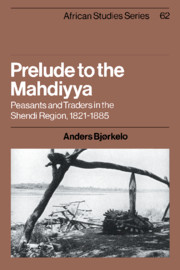
-
Select format
-
- Publisher:
- Cambridge University Press
- Publication date:
- October 2009
- March 1989
- ISBN:
- 9780511563010
- 9780521534444
- Dimensions:
- Weight & Pages:
- Dimensions:
- (228 x 152 mm)
- Weight & Pages:
- 0.324kg, 212 Pages
- Series:
- African Studies (62)
Book description
During the first colonial period (the Turkiyya, 1821–85), the Shendi region of the Northern Sudan was inhabited by peasants, traders and nomads. This book analyses socio-economic change among the peasants and traders during this formative period of Sudanese history. Administration, agriculture and trade in transition from a pre-colonial to a colonial economy are discussed. Anders Bjørkelo argues that Turkish demands for cash-crop cultivation and taxation in cash ruined the villages and towns and undermined the local subsistence economy, and that the role of traders as mediators in the process of monetisation contributed to stagnation and rural indebtedness. By combining a thorough mastery of the travel literature with examination of previously unknown manuscript sources, notably the private papers of a prominent Sudanese merchant, he is able to offer a closer view of the situation of trader and peasant families. For the first time it is possible to consider the period from a Sudanese point of view. Dr Bjørkelo concludes that General Gordon's policy of driving back to the impoverished north the waves of emigrants to the Southern Sudan was instrumental in triggering off the Mahdist movement, and also interestingly suggests points of comparison between reactions to Muslim, as against European, imperialism.
Contents
Metrics
Altmetric attention score
Full text views
Full text views help Loading metrics...
Loading metrics...
* Views captured on Cambridge Core between #date#. This data will be updated every 24 hours.
Usage data cannot currently be displayed.
Accessibility standard: Unknown
Why this information is here
This section outlines the accessibility features of this content - including support for screen readers, full keyboard navigation and high-contrast display options. This may not be relevant for you.
Accessibility Information
Accessibility compliance for the PDF of this book is currently unknown and may be updated in the future.


